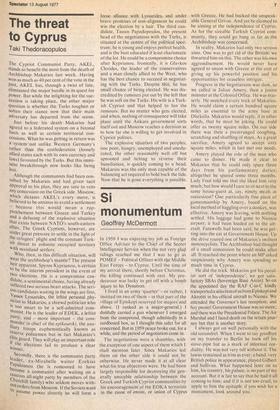Si monumentum
Geoffrey McDermott
In 1958 was enjoying my job as Foreign Office Adviser to the Chief of the Secret Intelligence Service when the not very glad tidings reached me that I was to go as POMEF — Political Officer with tile Middle East Forces — to Cyprus. Until the time of my arrival there, shortly before Christmas, the killing continued with zest. My predecessor was lucky to get off with a bomb injury to his Dynatron.
I lived in an army 'quarter' — or rather, I insisted on two of them — in that part of the village of Episkopi reserved for majors'and above. (1 ranked as a major-general.) I dutifully carried a gun whenever I emerged from the compound, though admittedly in a cardboard box, as I thought this safer for all concerned. But in 1,959 peace broke out, for a while, and the period of negotiation came in.
The negotiations were a shambles, with the exception of one aspect of them which 1 shall mention later. Since Makarios led them on the other side it could not be otherwise. lie never made it at all clear
what his true objectives were. He had been largely responsible for destroying the generally amicable relationship between the Greek and Turkish Cypriot communities by his encouragement of the EOKA terrorists in the cause of enosis, or union of Cyprus
with Greece. He had backed the unspeakable General Grivas. And yet he claimed to be aiming at the independence of Cyprus. As for the sizeable Turkish Cypriot community, they could go hang as far as the Archibishop was concerned.
In reality, Makarios had only two serious aims. One was to get rid of the British: we thwarted him on this. The other was his own aggrandisement. He would never have agreed to union with Greece at the cost of giving up his powerful position and his opportunities for ceaseless intrigue.
Progress in the begotiations was slow, so we called in Julian Amery, then a junior minister at the Colonial Office. He was masterly. He matched every trick of Makarios. He would claim a certain hundred square miles as essential to the army base at Dhekelia. Makarios would reply, if in other words, that he must be joking. He' could offer us twenty square miles. On our side there was then a prearranged coughing, scratching and shuffling Of maps. As a great sacrifice, Amery agreed to accept sixty square miles, which in fact met our needs.
Amery played the role of the man who came to dinner. He made it clear to Makarios that he could only spare three days from his parliamentary duties; altogether he spared some three months. Lady Foot told me that she liked him very much; but how Would I care to sit next to the same house-guest at, say, ninety meals in succession? One particularity fine piece of gamesmanship by Amery, based on the local method of haggling over a donkey, was effective. Amery was leaving, with nothing settled. His luggage had gone to Nicosia . airport; it had been loaded on to the aircraft. Farewells had been said; he was get-, ling into the car at Government House. Up the drive roared one of Makarios's swiftest motorcyclists, The Archbishop had thought of a small concession he could make after all. It reached the point where an MP asked suspiciously why Amery was spending so much time in Cyprus.
He did the trick. Makarios got his peculiar sort of 'independence'; we got satisfactory SBAs (Sovereign Base Areas). So on the appointed day the RAF C-in-C kindly transported a selection of us from Episkopi and Akrotiri in his official aircraft to Nicosia. We attended the Governor's last reception; and hey presto! Government House was no more; and there was the Presidential Palace. The Air Marshal and 1 faced death on the return jour-. ney but that is another story. 1 always got on well personally with,the old scoundrel. When I went to say goodbye on my transfer to Berlin he took off his stove-pipe hat as a mark of informal cordiality. He was not very tall without it. The lawns remained as trim as ever; a band, very British police in appearance, played Gilbert and Sullivan. What happened later on to him, his country, his palace, is no part of my account. But it is fair to say that he had it all coming to him; and if it is not too cruel, to apply to him the epitaph: if you wish for a monument, look around you.


































 Previous page
Previous page